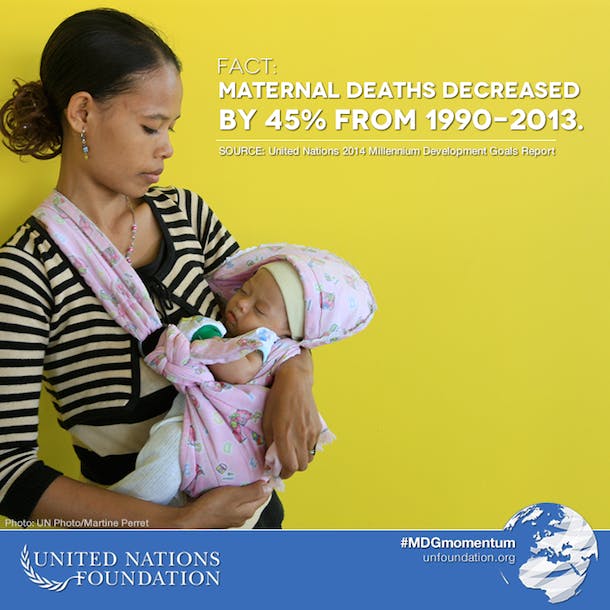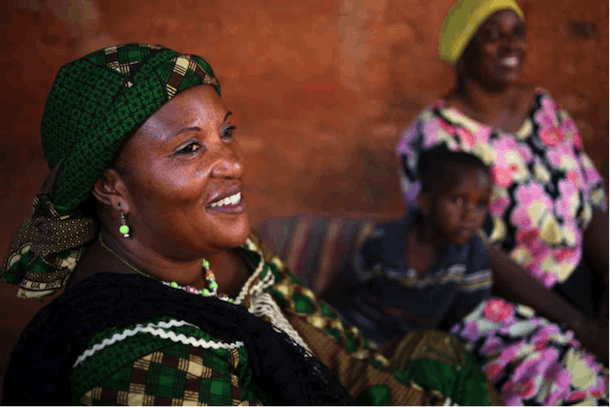Our blog series “5 Days, 5 Facts, 5 Reasons to Act” today highlights improvements in maternal health, an important aim of the Millennium Development Goals.
FEATURED FACT:

Healthy mothers mean healthy families. According to the United Nations Population Fund (UNFPA), “When mothers die, their families are much more vulnerable, and their infants are more likely to die before reaching their second birthday.”
Most maternal deaths are preventable, and the UN and partners have mobilized to expand access to life-saving solutions such as trained midwives and voluntary family planning.
Yet progress hasn’t been fast enough, and today, on average, almost 800 women die each day from complications from pregnancy and childbirth. Making sure all women have access to the health care they need and deserve is the right thing to do; it’s also the smart thing to do to build healthier families and communities.
One of the best ways to improve the health of women and reduce maternal deaths is to expand access to voluntary family planning. Right now, more than 225 million women around the world don’t want to get pregnant, but aren’t using modern contraception – largely because they don’t have access. If this unmet need was filled, 79,000 fewer women would die in childbirth, and women around the world would have the power to decide to get pregnant if and when they want.
Family Planning 2020 (FP2020) is a global partnership that works with governments, civil society, multilateral organizations including the UN, donors, the private sector, and the research and development community to enable 120 million more women and girls to use contraceptives by 2020. FP2020 is underpinned by a rights-based approach that upholds the principles of empowerment, voluntarism, and access to comprehensive, quality care.
FP2020 shared with us a story about what family planning means to the life of a woman.
FEATURED STORY:
By Kelly Dudine, Family Planning 2020
Aisha has a quiet smile and a calming presence. Sitting on a colorful blanket outside her family’s home, her more boisterous sisters laugh and talk around her. She waits patiently for a break in the excitement to explain that one of her younger sisters is soon to be married and the family is discussing the wedding arrangements.

As they speak, two of the women nurse newborns while children play around their feet. A girl no older than 5 emulates the women, caring for her baby brother who is asleep in a wrap on her back. The scene is typical of this small village in the Kigoma region of Tanzania.
Aisha is one of 16 children. When asked to describe her mother, her composed presence falters for a moment; she only seems to remember her mother being pregnant, or very weak, or both. Only half her siblings survived. Six died at birth, and two when they were very young. In her large family, it was difficult for each child to get the care they needed – education, health care, and attention were lacking.
Through a translator, she said that in her community, “It is common for children to die. When children cannot develop, families cannot develop, communities cannot develop.” Here, children raise children, girls marry young, and the health of mother and child is constantly at stake.
To Aisha, the biggest challenge for women is not being able to determine the number of their children. They cannot go to school, and they cannot join community activities. They spend their time and energy caring for their children, only to find that they still do not have enough to give. Aisha decided early on that she wanted a chance at a different life.
The first time Aisha heard about family planning, it was through rumors in her village. Contraceptives cause cancer and infertility, she was told; good women produce large families.
But after she gave birth to her first child at the Ujiji Health Care Center – a facility supported by Family Planning 2020 partners USAID and Bloomberg Philanthropies through their implementing partner EngenderHealth – the nurse asked if she and her husband were interested in learning about family planning. Together, they discussed a variety of methods, potential side effects and benefits, and options that would best suit their needs. Aisha’s concerns eased, and she felt empowered to decide for herself on the matter. She would space her children.
Challenging the cultural norms did not prove to be as easy. Her family was furious. They believed that not only had she put herself at risk, she had made herself seem immoral. But the memory of her mother’s life and the everyday reminders of young, struggling mothers – including her own sisters – were too powerful. She persevered. When she and her husband felt ready to have a second child, they stopped using contraceptives and Aisha became pregnant again. This surprised her family and helped to dispel the myths they had once believed.
Aisha is now a champion for family planning. By simply being able to space her children, Aisha says she has ensured her health and the health of her babies. She has been empowered to finish school, to work, and most importantly, to be a good mother to all her children.
“The strength of the women in my community, is the ability to sustain themselves – to persevere,” she said. “If given the opportunity, they can work hard and live strong lives. And all women deserve the right to do so.”



 View All Blog Posts
View All Blog Posts